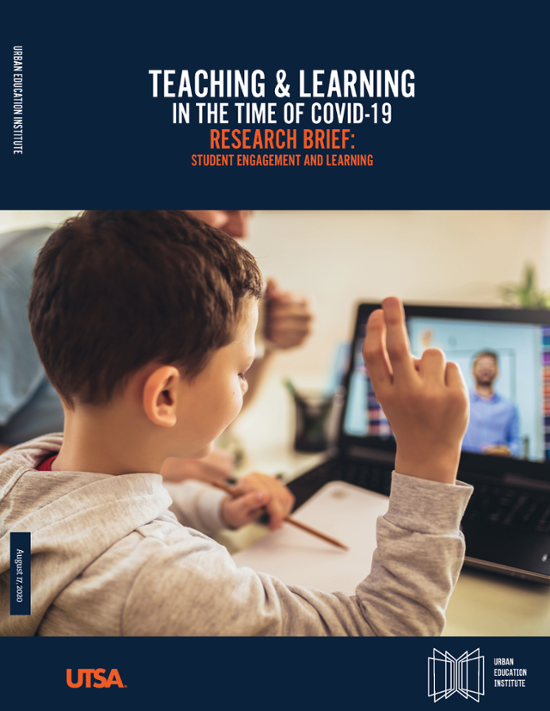
AUGUST 19, 2020 — As many public K–12 schools reopen this week to a period of distance learning, a new UTSA study identifying what makes online education engaging and effective is providing a framework for local school districts’ fall planning.
The UTSA Urban Education Institute, directed by Mike Villarreal, spent the summer surveying almost 2,000 public school students, parents and teachers across eight school systems in San Antonio to find out what worked and what didn’t during early pandemic schooling to engage students and advance their learning.
“For this report, we really wanted to take a deep dive into understanding the types of distance-learning techniques and approaches that benefitted students most,” Villarreal said. “We found multiple solutions for motivating online learners. And we identified school systems that have emerged as early leaders in engaging students remotely.”
 While 64% of students and parents said less learning took place during the spring—compared to “normal,” prepandemic schooling—a majority also said they were understanding of the extreme circumstances teachers faced when the virus outbreak forced campuses to suddenly close. Of those parents and students surveyed, 57% said teachers could not have done anything more to improve upon postpandemic spring learning.
While 64% of students and parents said less learning took place during the spring—compared to “normal,” prepandemic schooling—a majority also said they were understanding of the extreme circumstances teachers faced when the virus outbreak forced campuses to suddenly close. Of those parents and students surveyed, 57% said teachers could not have done anything more to improve upon postpandemic spring learning.
The research is the second brief out of the comprehensive Teaching and Learning in the Time of COVID-19 survey project by the Urban Education Institute. The first report, released earlier this summer, focused on early challenges with distance learning as identified by teachers.
The majority of students learned less after schools went to distance learning, compared to prepandemic schooling. But a small segment of students actually learned more.
What worked during emergency distance learning:
What didn’t work:
Students and parents understood and sympathized with the extreme circumstances teachers were working under after the sudden shift to distance learning.
School districts participating in the ongoing research represent some of the largest and most diverse in the city. They include East Central, Edgewood, Harlandale, Judson, Northside, North East and Southwest. An eighth set of schools that partner with traditional public school districts known as the Centers for Applied Science and Technology Network also participated.
The research collaboration is helping inform local planning to improve distance learning within participating school systems. Superintendents, administrators and teachers are using the analysis for evidence-based strategies promoting quality distance and hybrid-blended learning approaches.
⇒ Explore the work of the Urban Education Institute at UTSA.
Villarreal said the inclusion of the CAST network in the project represents an opportunity to better understand how schools designed to blend online and in-person instruction weathered the sudden shift to emergency distance learning.
“These findings show that the principles of learning and teaching that engaged students when they were in the classroom also apply to online learning,” Villarreal said. “It doesn’t matter if it’s in the classroom or on a screen. We know that students are most likely to engage when they feel connected to the teacher, to one another and to learning activities that challenge them.”
UTSA Today is produced by University Communications and Marketing, the official news source of The University of Texas at San Antonio. Send your feedback to news@utsa.edu. Keep up-to-date on UTSA news by visiting UTSA Today. Connect with UTSA online at Facebook, Twitter, Youtube and Instagram.
Move In To COLFA is strongly recommended for new students in COLFA. It gives you the chance to learn about the Student Success Center, campus resources and meet new friends!
Academic Classroom: Lecture Hall (MH 2.01.10,) McKinney Humanities BldgWe invite you to join us for Birds Up! Downtown, an exciting welcome back event designed to connect students with the different departments at the Downtown Campus. Students will have the opportunity to learn about some of the departments on campus, gain access to different resources, and collect some giveaways!
Bill Miller PlazaCome and celebrate this year's homecoming at the Downtown Campus with food, games, giveaways, music, and more. We look forward to seeing your Roadrunner Spirit!
Bill Miller PlazaThe University of Texas at San Antonio is dedicated to the advancement of knowledge through research and discovery, teaching and learning, community engagement and public service. As an institution of access and excellence, UTSA embraces multicultural traditions and serves as a center for intellectual and creative resources as well as a catalyst for socioeconomic development and the commercialization of intellectual property - for Texas, the nation and the world.
To be a premier public research university, providing access to educational excellence and preparing citizen leaders for the global environment.
We encourage an environment of dialogue and discovery, where integrity, excellence, respect, collaboration and innovation are fostered.